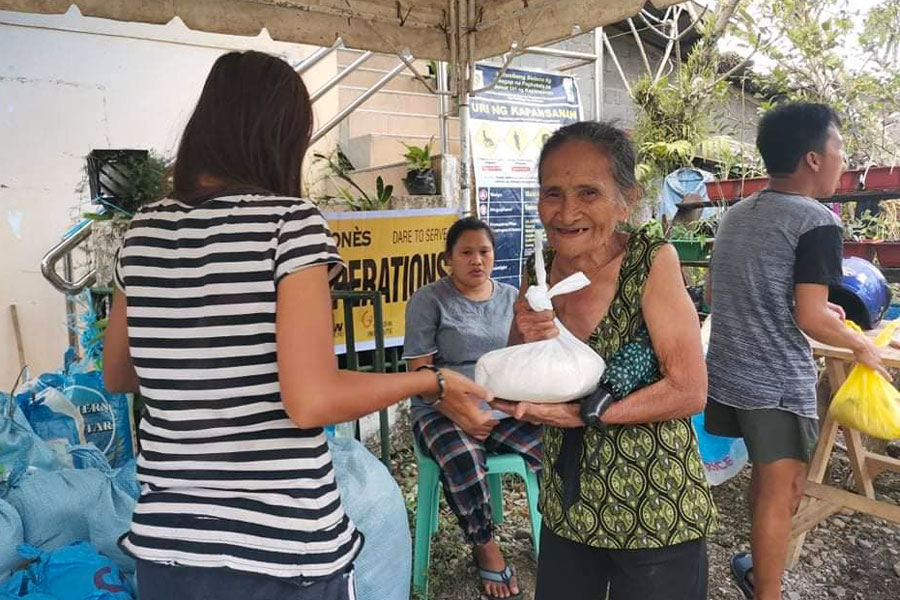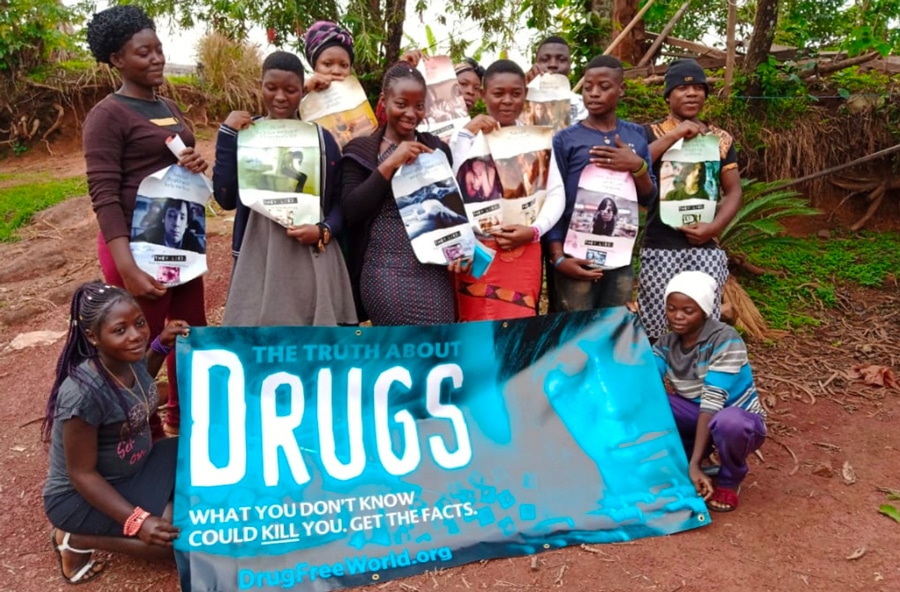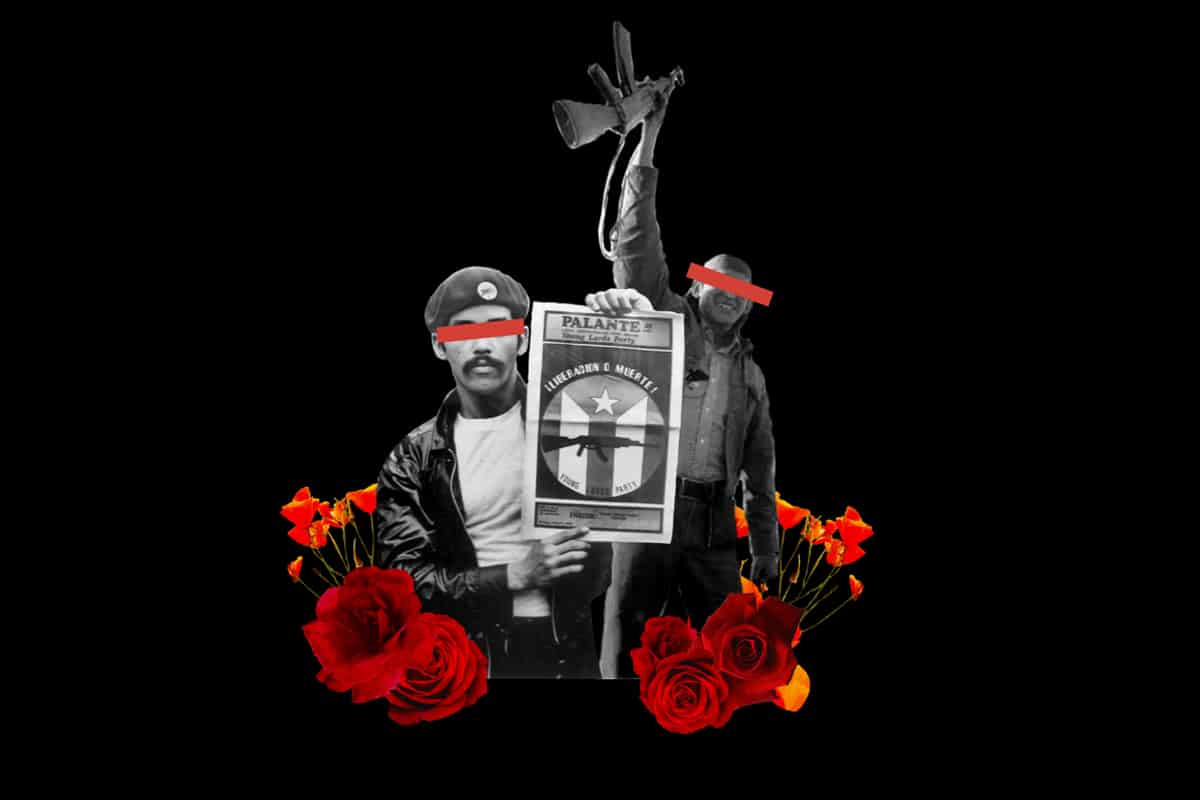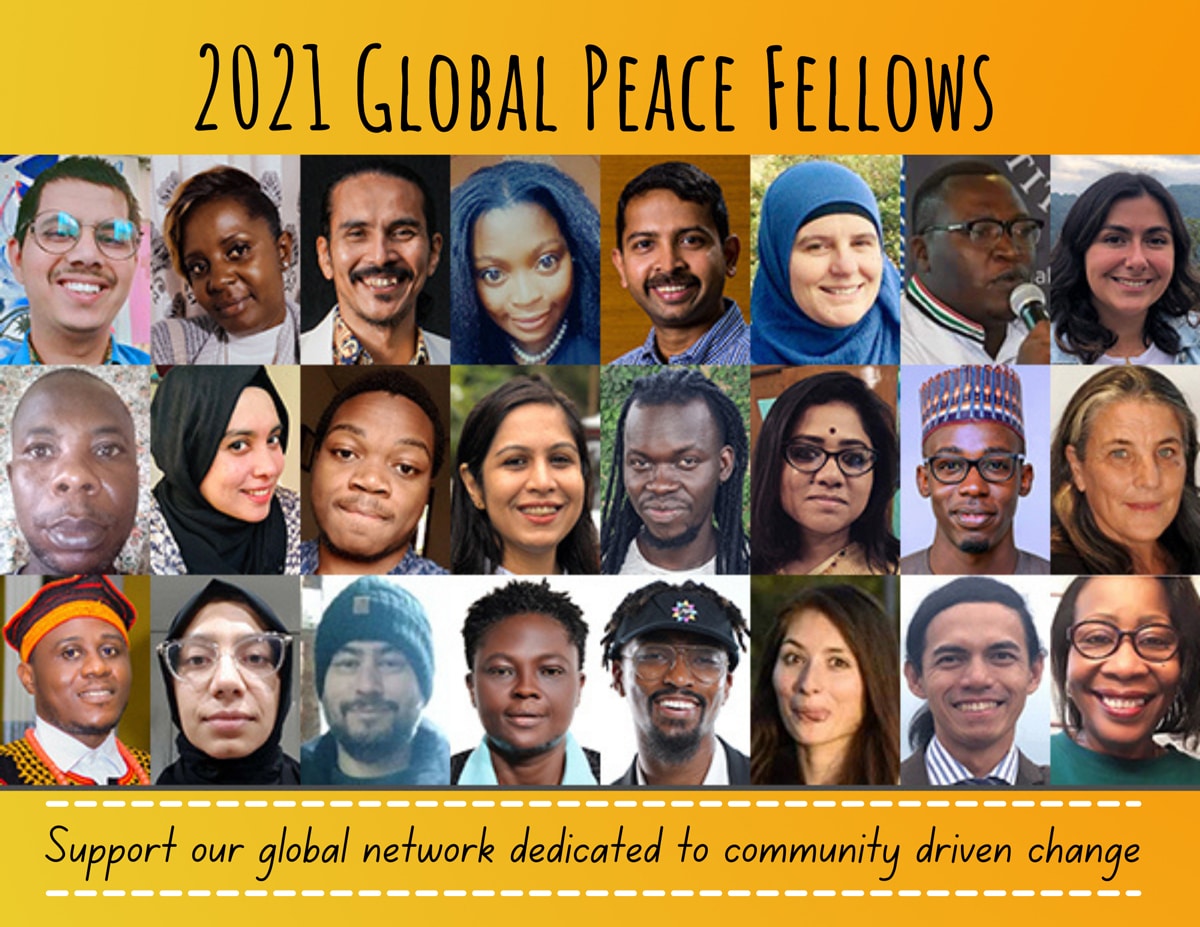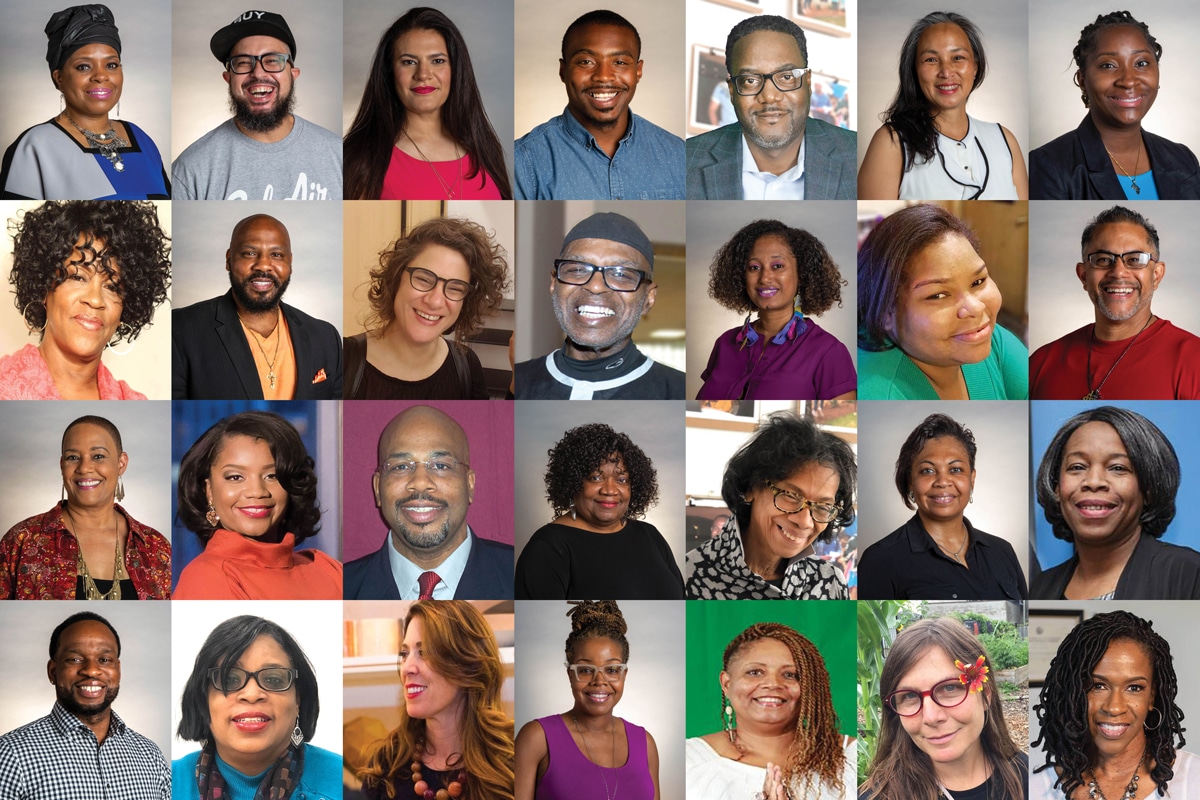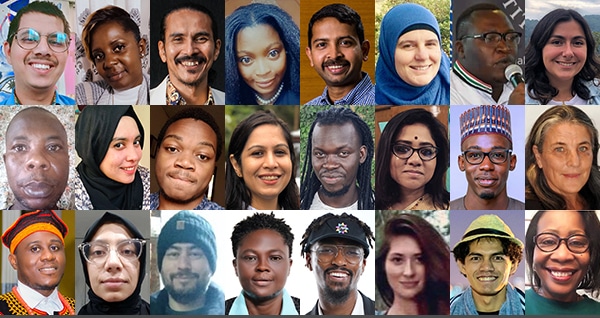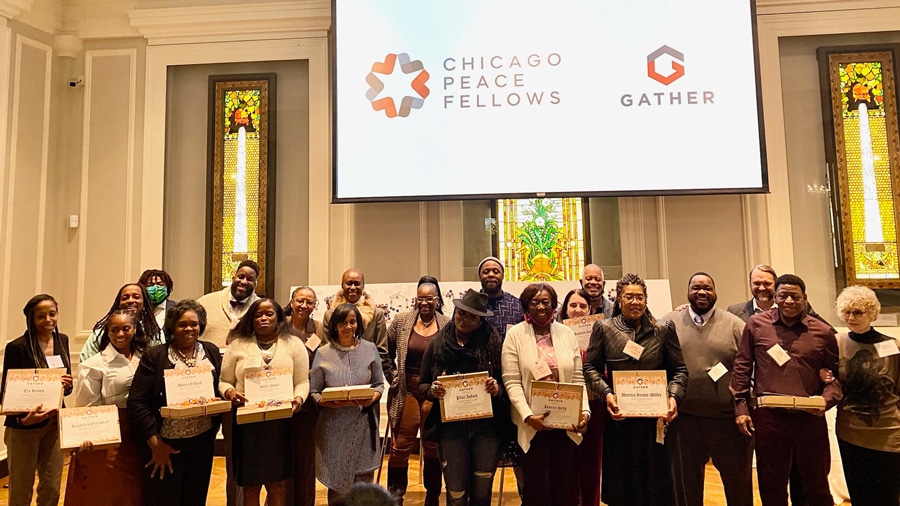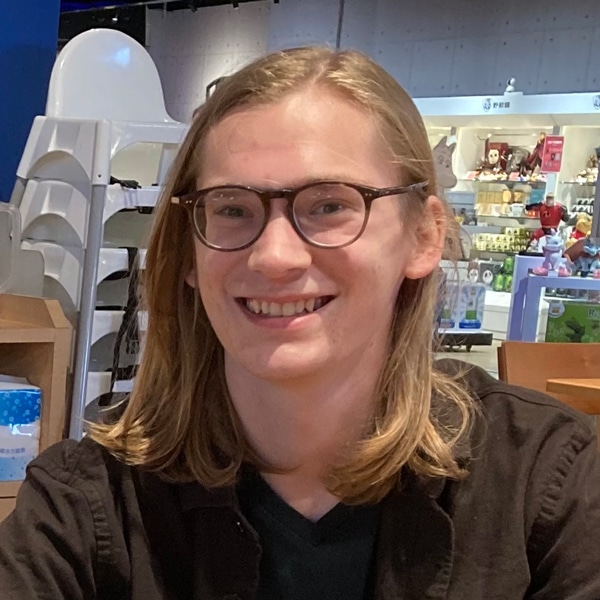Fellows Lead Relief Operations for Typhoon Odette Victims
By Andy Alegre, Global Fellow from the Philippines
With support from Goldin Institute board member Nathan Shapiro, I joined forces with Goldin Institute associate Susana Anayatin to deliver critical food and supplies to 482 families who were impacted by Typhoon Odette in the Philippines.

Leveraging our local contacts and connections with the Humanitarian Order of Sierra Falcones, Inc. (SF), Eastern Samar Chapter, we were able to distribute 482 relief packages filled with food, supplies, clothes and toys to targeted households affected by Typhoon Odette (International name, Rai) in Barangay Lunas, Maasin City, in Southern Leyte.
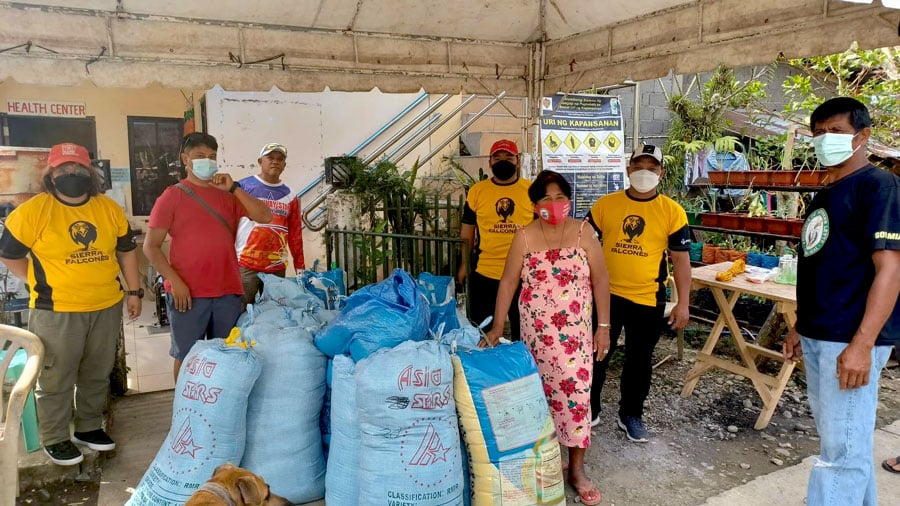
Barangay Lunas is a small community affected by Odette within the overall area of Maasin, which has a population of 87,446. The city is one of the hardest hit by the typhoon in the disaster-hit region in the Visayas with power yet to be restored and intermittent communication service.
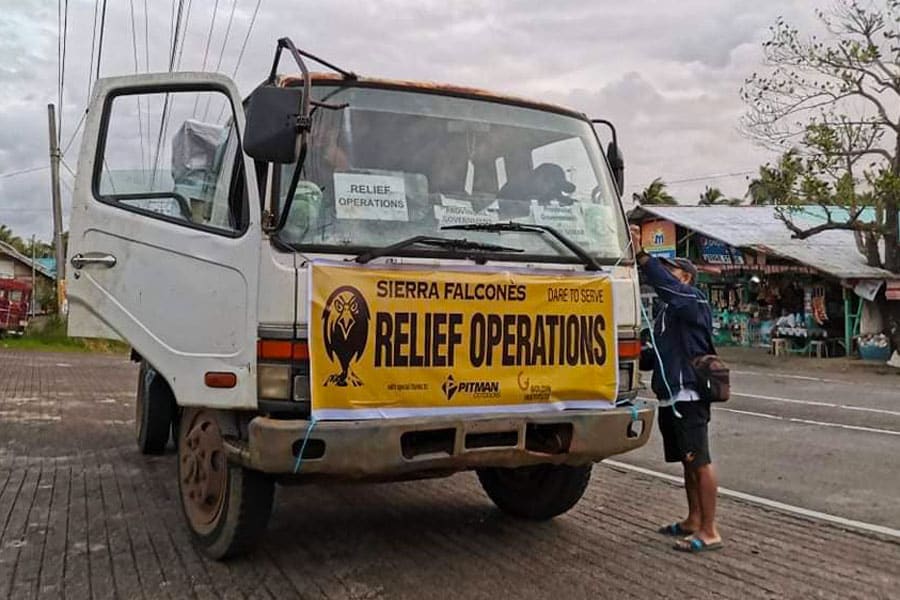
The SF members and volunteers were assisted by barangay officials in the distribution of relief supplies. The food and non-food items were prepared and repacked over a few days in Borongan City, Eastern Samar through the support and donation of various partners, organizations, individuals, and volunteers. These critical supplies were then loaded in a truck and sent to Maasin City. Coordination efforts were made by SF volunteer, Mr. Ariel Mendez of the Lunas Elementary School to the barangay council for the relief efforts.
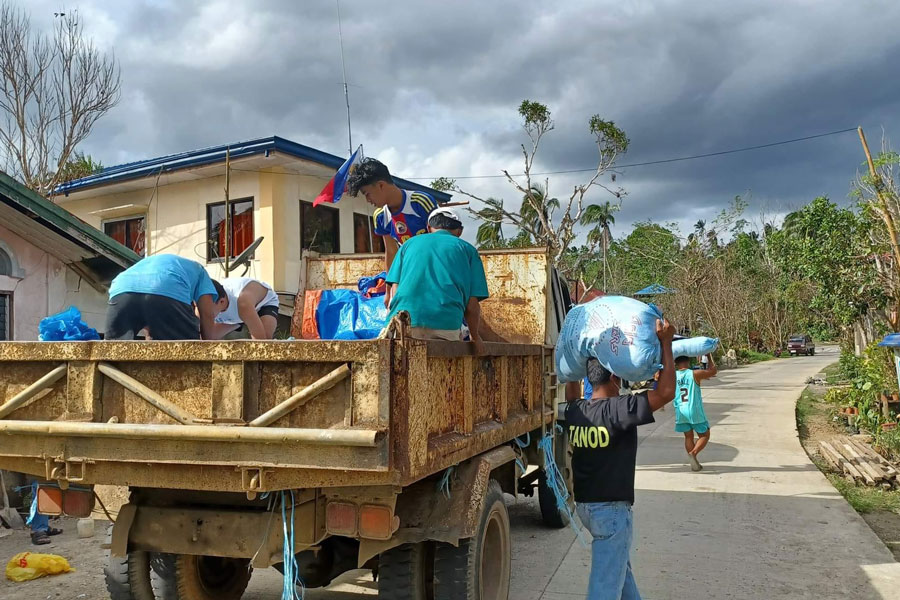
The area remains in need of support even though the Typhoon made landfall back on 16 December 2021. It brought torrential rains, violent winds, landslides, and storm surges. UN OCHA reported on December 30, that over 6.2 million people were affected across 10 regions. About 580,000 remain internally displaced with 356,000 people staying in evacuation centres while 227,000 people staying with host families or friends. The total death count is 397.
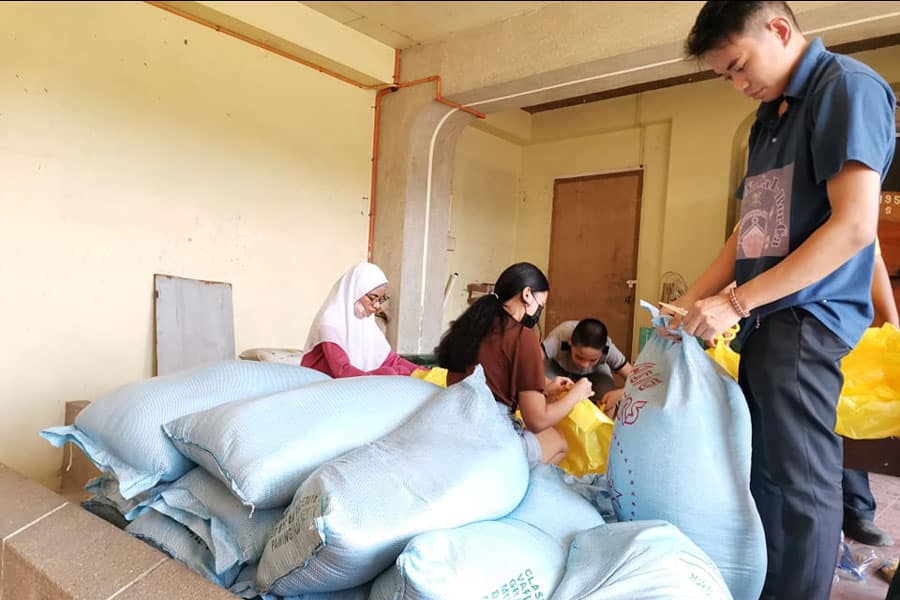
SF continues to plan and coordinate relief operations to different areas through its members and volunteers located in various chapters. Apart from the ongoing relief operations, SF strengthens its education programs through book drives, provision of education materials and radio-based instructions to remote communities at this time of pandemic.
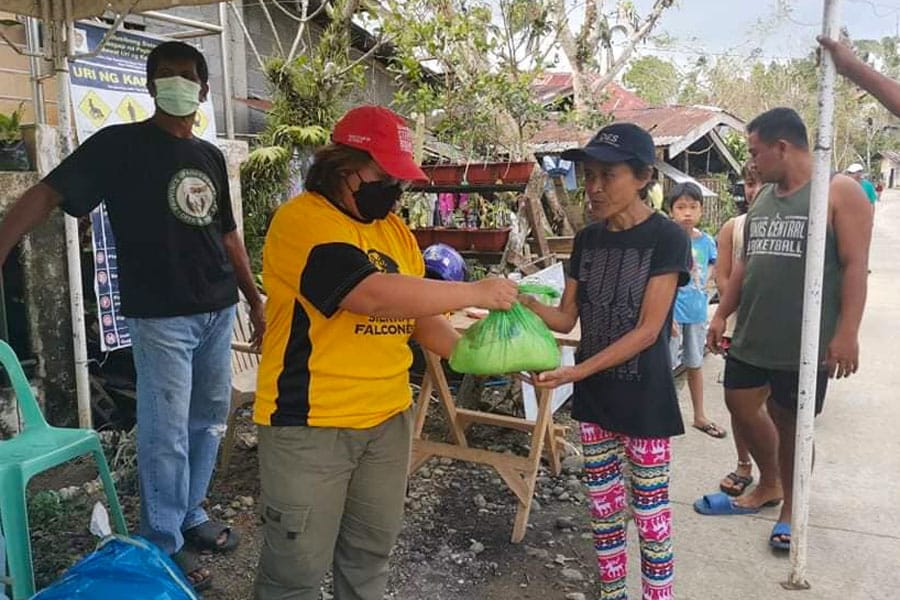
Again, thank you to the board and staff of the Goldin Institute, especially Nathan Shapiro, for standing with us in this time of crisis and rebuilding.
Global Fellows from Cameroon and the UK on a mission to help youth plan their future
By Mathias Ngong Njoya, Global Fellow from Cameroon
Personally, I have been unsuccessful in achieving new years’ resolutions! I also came to realize that many other young professionals are faced with a similar issue. So, I decided to come up with a biannual workshop that would help train and guide youth on professional development planning. We call it the Blueprint Workshop.

I teamed up with Dr. Gopal from the UK (a peer who I met during the 2021 Goldin Fellows Program) to join hands with my remote team members from Nigeria and Ghana in launching the biannual blueprint workshop. This two-day workshop took place from Jan 29 to 30th 2022 and brought together 30 youth from 15 countries in Africa and Asia. The second workshop of the year will be taking place in July 2022. The key objective for this first workshop was to invite young professionals to start the New Year with a clear set of achievable goals and provide them with goal-setting skills.
We had six speakers providing coaching on a range of topics such as the SWOT analysis (Strength, weakness, opportunities, and threats), effective goal setting, growth mindset, time management, overcoming procrastination, and development planning. We also shared templates that ga ve guidance to participants in implementing milestones which are key to achieving their goals. We have planned to pair all participants with accountability partners who will check in with them periodically. We are going to meet again with all the participants in the middle of the year to assess their progress together and offer additional support where required.
Participants shared positive feedback at the end of this two-day workshop with some requesting for the Blueprint workshop to be held quarterly so that they can track, learn and course-correct their plans in more regular periods.
"I used to think that SWOT is a tool only used by companies to devise strategies and assess markets. Through the workshop, I learned how to utilize SWOT for my own personal planning and strength assessment."
We hope to make the blueprint workshop available to more youth. It is useful to help them analyze factors outside their control while making plans. And tools such as time management can really help everyone become productive rather than simply being active. If you do not know how to prioritize, you will often not be productive.
Reflecting on the success of the workshop, I think it is crucial that I explore ways to partner with more Goldin Institute Fellows. Working with Dr. Gopal was great, and I now feel like I know him way better because we spent time planning and working together for the success of this workshop.
LEGAL Celebrates 10 Years of Advancing Human Rights in Liberia
By Jennifer Kuwa Henshaw, Global Fellow from Liberia
We recently celebrated our 10-year anniversary which marked the progress we have made in advancing human rights for LGBT individuals in Liberia. We also used the occasion to honor the contribution of our supporters and to share our hopes for the future. The anniversary celebration took place on 26th January 2022 and brought together local and international stakeholders. Reflecting on the occasion, one of our team members remarked:
“This was our chance to step back and look at the past and present activities. To learn from where we started, where we are, and where we are going.”
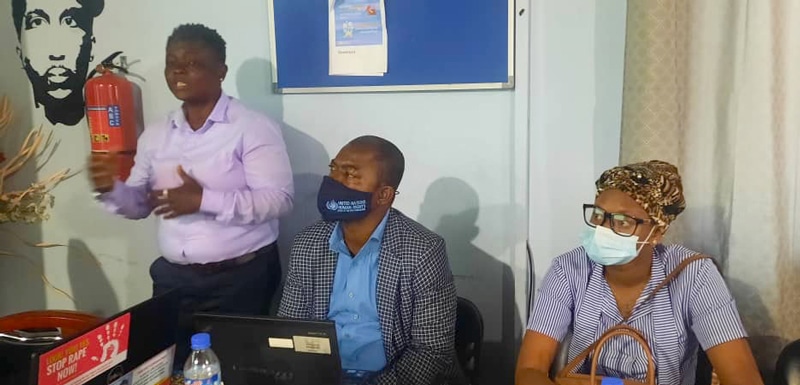
We started the Lesbian and Gay Association of Liberia (LEGAL) in 2012 to advocate for the rights of marginalized groups through awareness raising activities while providing direct support to those most-affected. For ten years, we have stood firmly as the voice of sexual minority groups in Liberia, speaking against discrimination, injustices, stigmatization, violence and abuse. We also work with stakeholders to help provide economic empowerment, health services, access to justice and education, all in addition to promoting the fundamental principles of human rights.
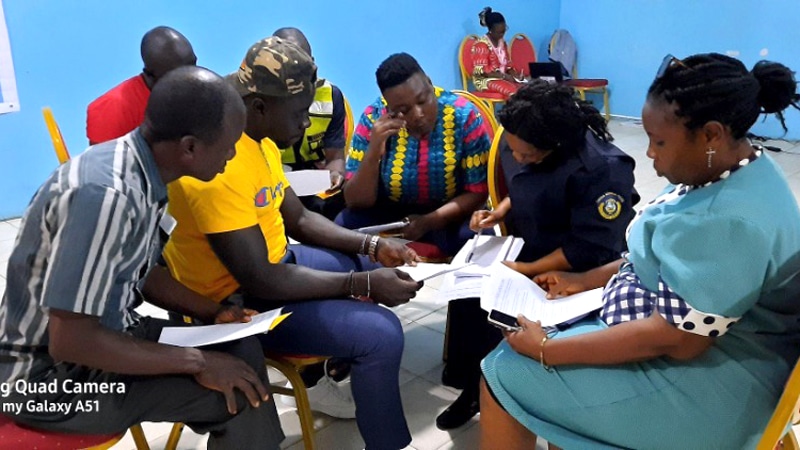
During the anniversary, we shared the following accomplishments with guests and stakeholders who joined us:
- Established the Protection Focal Persons at the Nine Police zones in Monrovia and Nimba county
- Strengthened mechanisms for Institutional capacity building
- Partnered with CSOs, Government line Ministries, NGOs, Partners, Foreign Missions, the Religious and Traditional Communities
- Strengthened relationships with Donors who continued to support our work
- Assigned Peers and Outreach Officers at the Community level who continue to document cases of abuse or violence committed against LBT women, girls, sex workers, drugs users, people living with complicated health issues and people living with disabilities
- Improved Community’s awareness on human rights advocacy and the referral path way in terms of access to health and justice
- Trained 1,183 people of whom 75% are community members. Some of the trainees are still actively involved to date
- Hate cases recorded are 93; 52 from Montserrado, Margibi 7, River Cess 21, Lofa 1, Grand Gedeh 1, Bong 1 . Cases ranging from rape, murder, GBV, SGBV, family neglect, child neglect, child trafficking, stigma and discrimination, kidnaping, sex trade, FGM, burglary and natural disaster
- Project locations have increased and we are now operating in 16 locations beyond Monrovia
The event was also an opportunity for us to thank our partners for continuing to support our mission. We issued certificates of appreciation to honor their contributions.
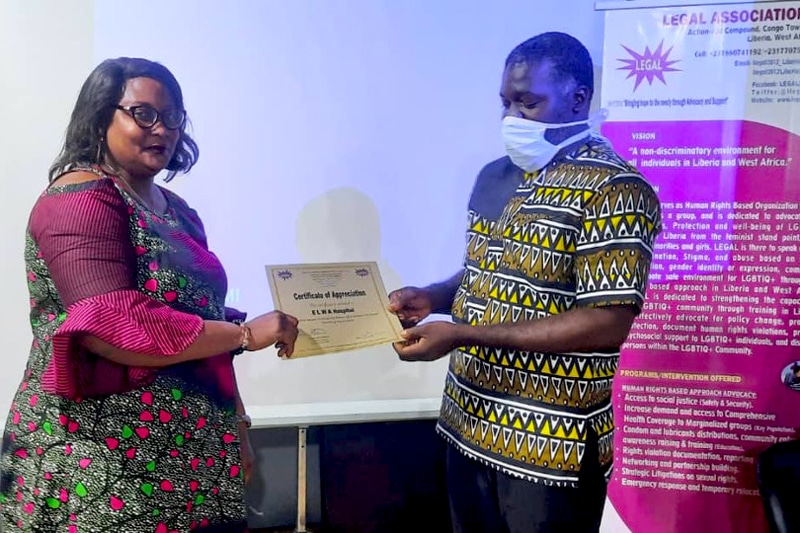
Despite having made huge progress since we started, LEGAL continues to face limitations that make our advocacy work less effective in addressing the magnitude of issues faced by marginalized groups. Some of the challenges we still face include limited funding capacity, limited partnership opportunities with the religious figures, existing stigma and limiting cultural beliefs, lack of access to basic health care services, hate related crimes against members of the LGBTIQs community, and the existing national law which discriminate LGBTIQs (the Penal Code Section 14.73,74 etc).
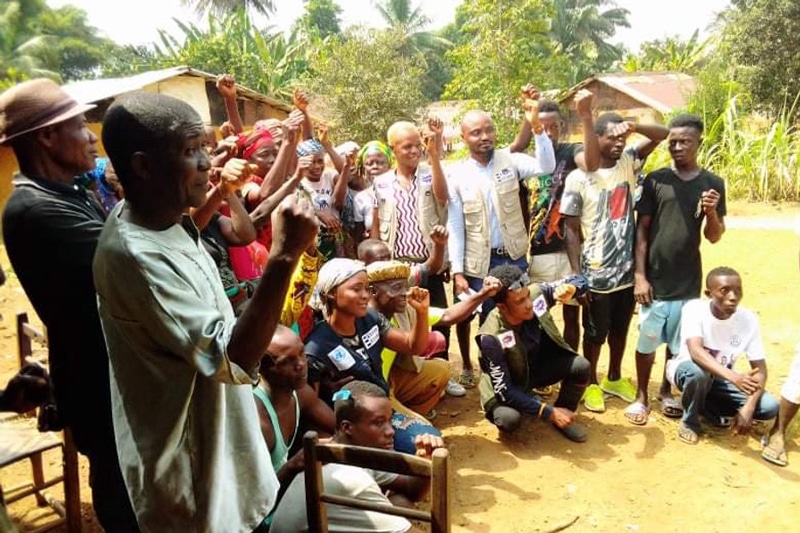
As we focus attention to the future, LEGAL plans to enhance the protection and access to basic health services, and human rights services for sexual minorities women, girls and other vulnerable groups. We also hope to increase advocacy and sexual reproductive education at community level. Our plan is to engage the following counties: Montserrado, Gbapolu, River Cess, Grand Bassa, Grand Gedeh, Mary Land, Grand Kru, Sinoe, Gbapoplu, Bomi, Cape Mount, Lofa, Nimba, Bong, and Margibi. This hope informs the core of our strategic plan 2022/2025 where we hope to continue addressing discrimination, violence, abuse, hate crimes, and stigmatization through increased community participation, awareness raising, empowermeent activities and human rights protection.
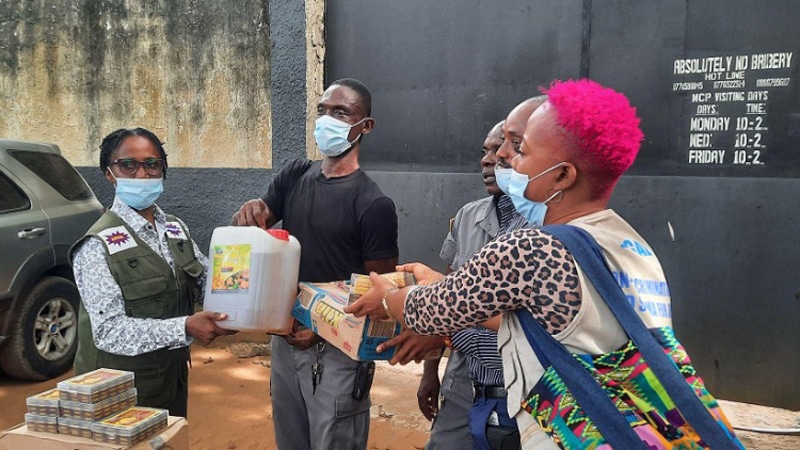
We also conducted Know Your Status Campaign on HIV and AIDS prevention, referral, treatment and stay on treatment campaign and awareness.
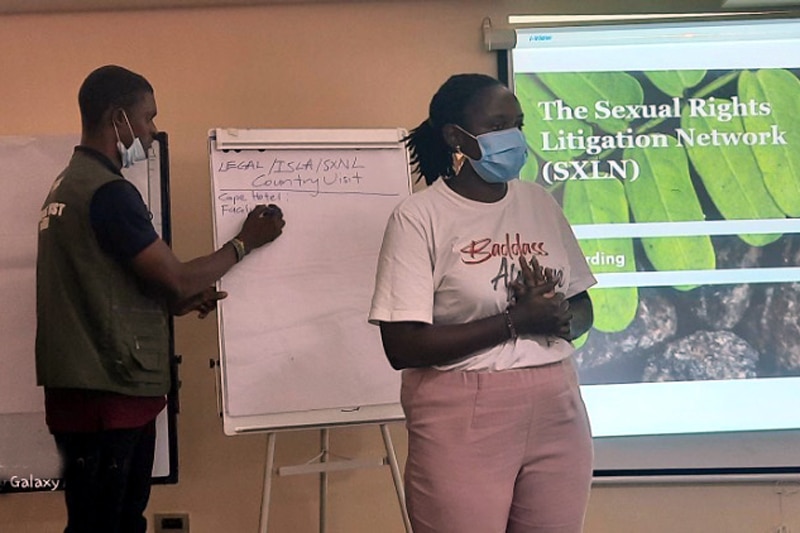
We also conducted training for Law Enforcement Officers for them to understand the rights of marginalized groups through the Human Right based approach through Solidarity Sisters (SoSNoL) who are the protection organization for the Marginalized groups in Liberia.
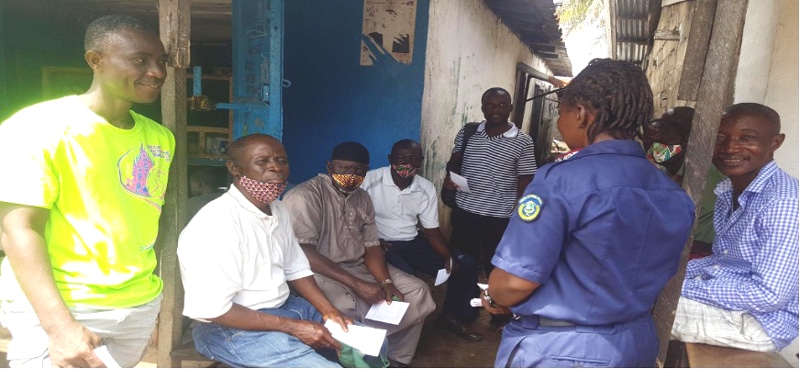
We also visited the Monrovia Prison Center and distributed Food and Non - Food Items for the inmates at the Prison Center.
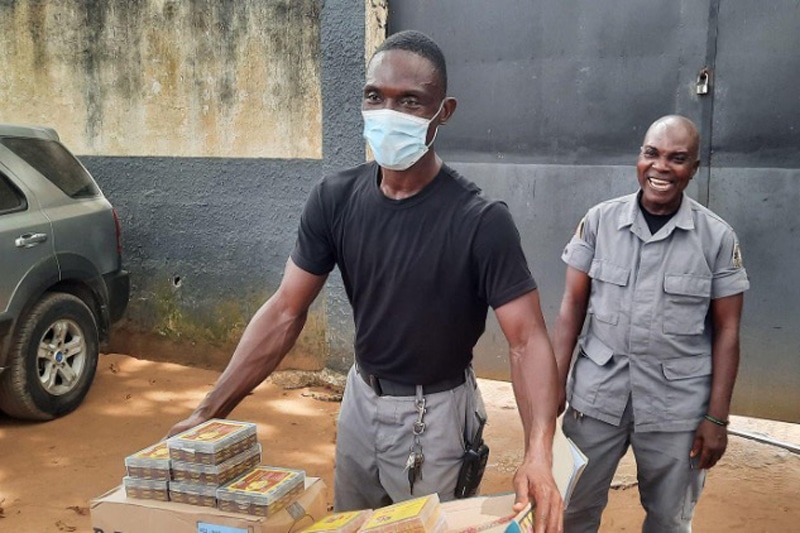
We also reach out to survivals that was brutalized by an ex Military guy that said that he has a vision for God saying that he should kill all Gay men in Liberia. We also conducted a one day meeting with lawyers to have a network that they will be representing LGBTIQ members in Liberia whenever they have cases at court level with the support from ISLA.
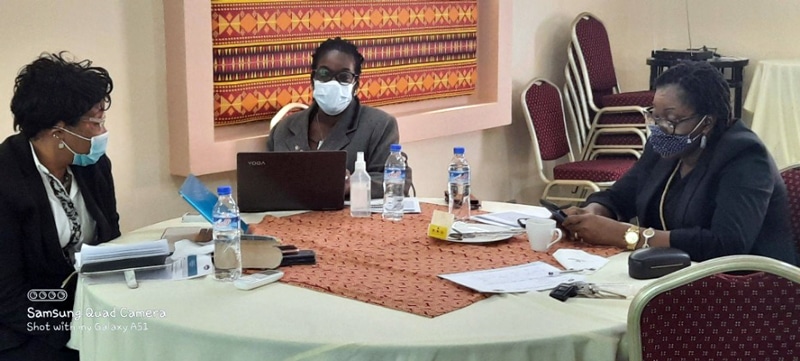
For LEGAL To be successful in implementing such a strategic plan, we are going to need support from all our stakeholders. We are going to require USD 500,000 to implement the project for the next 3 years. Additionally, we need help in developing partnerships with religious and traditional leaders, support to repeal the law that discriminates against members of the LGBTIQs community, support to conduct a mapping study of the LGBTIQs, sex workers, drugs users in 15 counties to understand their aspirations and personnel capacity building support.
We believe that by working together we can safeguard the rights of minority groups in Liberia and beyond. It starts with Me and You!
Crime Stoppers Microgrant Awarded to StickTalk
By Cree Noble, Team Coordinator
Last summer, our 22 Chicago Peace Fellows collaboratively designed and supported a wide range of peace building projects using a dedicated pooled fund for violence prevention. When creating projects, Annette Kelly noticed many of these projects dealt with youth, health, and well-being, but not with crime prevention directly. During the summer, she voiced her idea about having a project called Crime Stoppers that would address the violence in Chicago by directly engaging with those most likely to be a perpetrator or victim of crime.
Annette’s idea was well received by many fellows, but Dorothy Thompson and Tia Brown really stepped up and helped Annette with the formation and execution of this plan. The Crime Stoppers team met biweekly to figure out what was the best course of action. A few ideas about violence prevention were brainstormed such as hosting workshops around the topic, but after weeks of discussion, the team decided they wanted to give out a microgrant to a nonprofit who was already working with violence prevention.
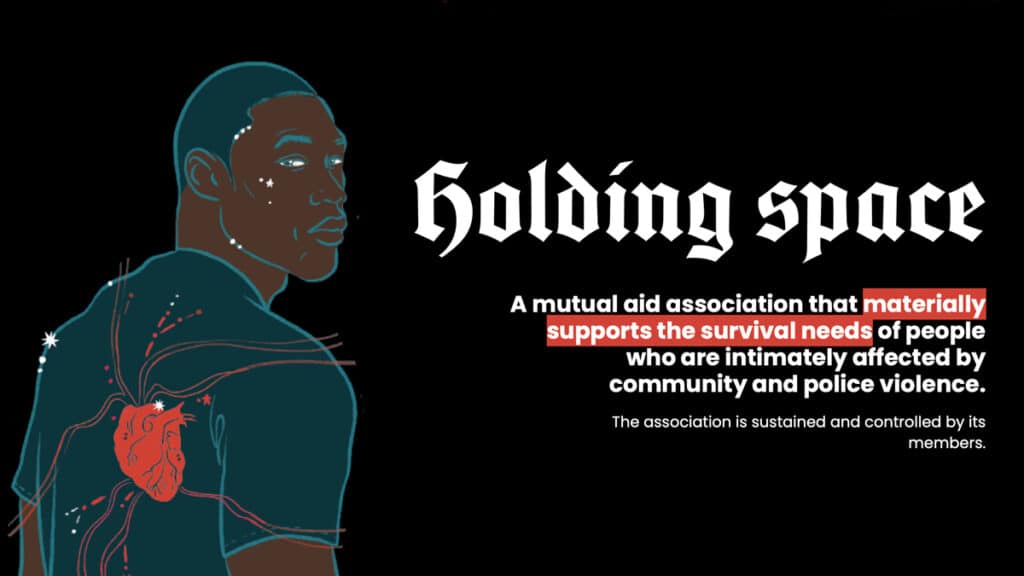
The application process was detailed and strategic in order to find the best candidate for this microgrant. Annette states, “we wanted to cast our nets wide” and wanted to look for an organization without all the “bells and whistles.” The microgrant was for $2,000 and 36 organizations applied. For the selection of the microgrant, Annette, Tia, and Dorothy came up with a rubric to follow as well as a scoring system. They ranked each group according to their mission statement, the population they served, and what they planned to do with the money.
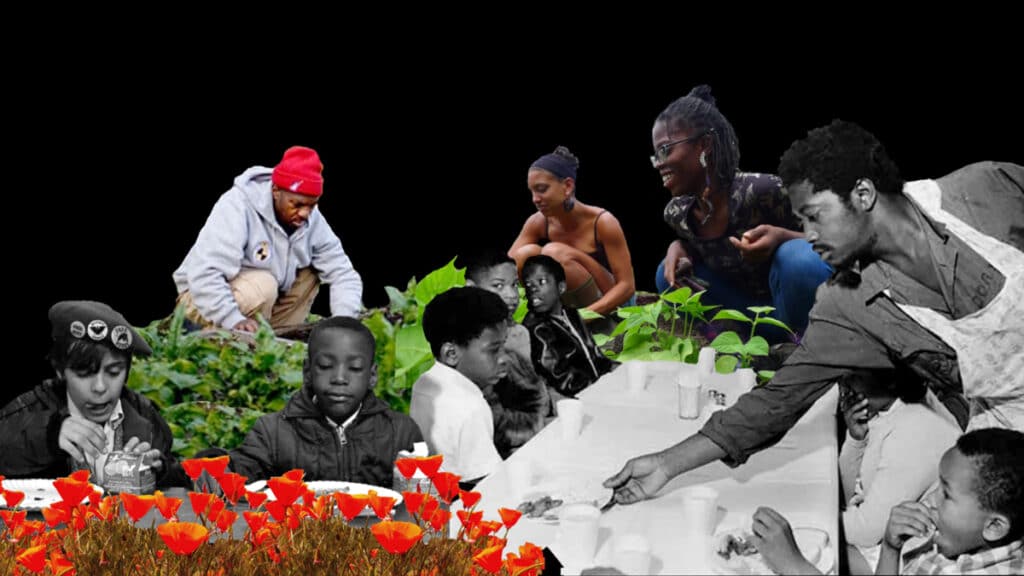
After weeks of going through each application, the organization Stick Talk was the recipient of the microgrant. According to Stick Talk’s website, “We reassess urban gun violence through the prisms of harm reduction and mutual aid. Our intention: to reduce the number of young Black people who are living at the edge of fatality, and to interrupt the demonization and criminalization of their politics of survival.” Tia says, “Stick Talk was the perfect organization for what we were looking for in a winner.”
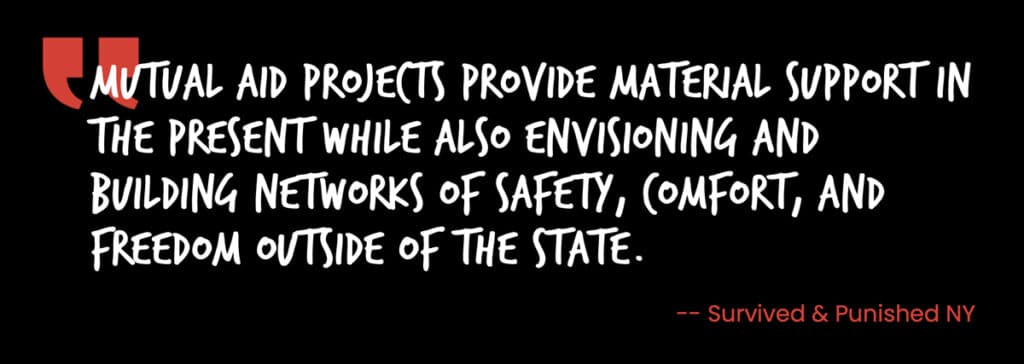
Crime Stoppers looks forward to seeing the grant be put in use at Stick Talk. They are also hoping to use extra funds they have to help families who have been impacted by violence.
Rebuilding in Haiti: Reflections on the 12th Anniversary of the Earthquake
Today marks the 12th anniversary of the 2010 earthquake in Haiti, which caused large-scale destruction to the country’s capital, Port Au Prince. It is a date Haitians will never forget; the day they experienced one of the worst natural disasters in the nation’s history, an earthquake registering 7.0 on the Richter scale. As the country continued to mourn the legacy of this disaster, in August of last year it was once again hit by another Earthquake, this time impacting the southwestern part of the island. The Earthquake was followed by Tropical Storm Grace two days later which swept across the country, causing further damage and suffering for the victims of the earthquake.
In response, the Goldin Institute launched a crowdfunding campaign to support our grassroots partners in Haiti, Daniel Tillias and Malya Villard-Appolon, who are on the frontlines responding to the needs of those most affected by the earthquake.
Will you join us in stepping up to support grassroots leaders in Haiti rebuild their lives?
The international response to the 2010 earthquake highlighted, starkly, disaster capitalism. Of the billions of dollars raised to help rebuild the country the majority was spent on foreign intervention and personnel, including international NGOs, UN agencies, and the US military. Very little of this money ever reached local communities, local businesses, or local civil society organisations.
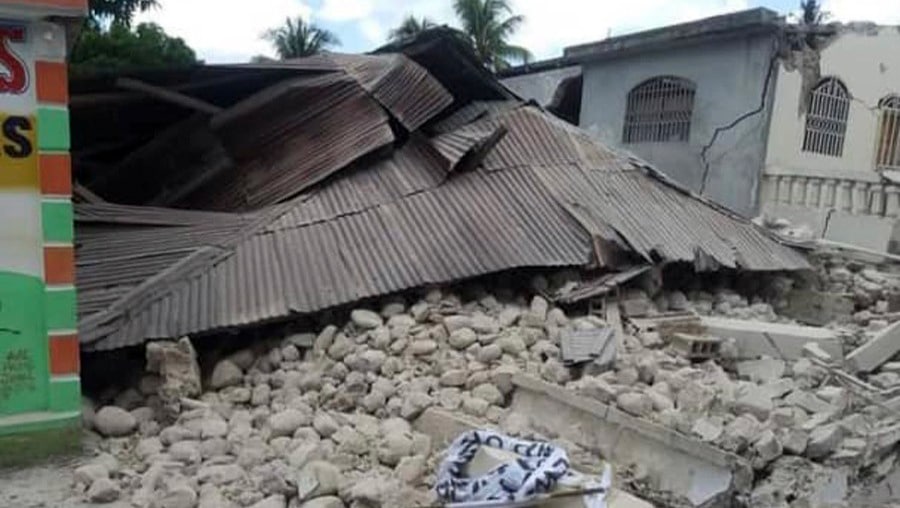
Not only did the people of Haiti have to deal with rebuilding their lives following the disaster, they also became aware of how their suffering was being used to profit international institutions and consultants. $6.4 billion which they never saw.
"We must learn from the mistakes from the response to the 2010 earthquake. We need to sustain local businesses. We must invest in Haitian communities and businesses and use their services in this disaster relief as much as possible.” – Daniel Tillias
Recognizing the impact of these past failures, many local activists and leaders are resisting this model of foreign intervention and reliance on hand-outs (or on the hope that they might materialize), and calling on international donors and funders to channel their support to grassroots actors who have the knowledge and networks to ensure funds are directed and used adequately.
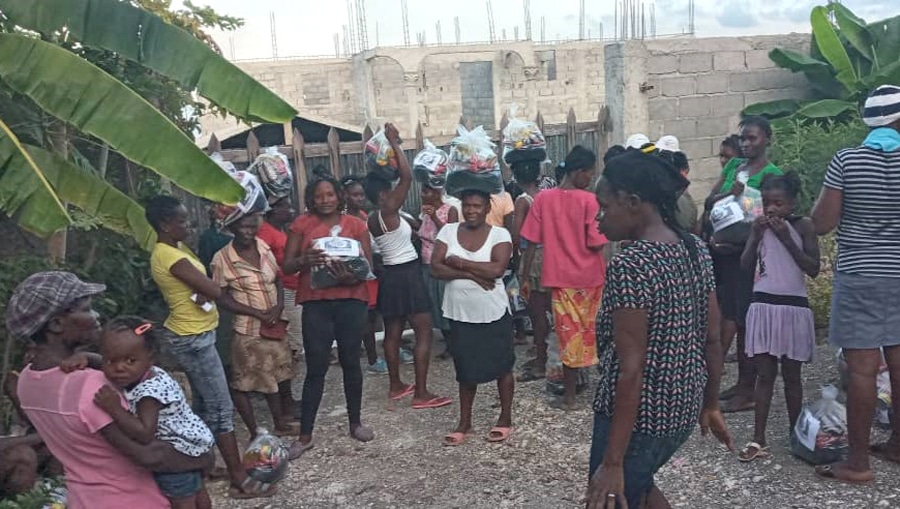
It has been five months since the 2021 earthquake hit Haiti. More than 2,200 people have died, 12,200 injured, and hundreds remain missing. More than 50,000 homes were destroyed and another 77,000 damaged. When reporting on disaster situations, death tolls often become shadowy figures and it becomes difficult to know what we can do to help; one of the most significant ways we can support is by trusting those local leaders who are on the frontlines of disaster response.
Daniel from Port au Prince, Haiti, works to improve the welfare of children and youth. In 2002 he co-founded a grass-root organization called SAKALA to promote peace and reconciliation in Haiti. With the computer Learning Center , Community Garden and sports activities, SAKALA has managed to provide a safe space in the heart of Cité Soleil (Haiti's largest underdeveloped area) where youth come together to grow, learn, and play.
Malya is a recipient of the CNN Hero Award due to her efforts against gender based violence in the displaced persons camps after the 2010 Earthquake in Haiti. She is also a co-founder of the Commission of Women Victims for Victims (KOFAVIV) working to support at risk women and girls.
As we reflect on this 12th anniversary of the great earthquake, we remain in mourning for Haitian families who lost so much, especially the women and children who were raped and abused as they were displaced to Petionville Square and other places across the country. We cannot forget. We need your support, especially for vulnerable women and girls who are still being victimized. -- Malya Villard Appolon
Together Daniel and Malya have been coordinating disaster response efforts on the ground to support children and women whose homes, businesses and families have been affected by the Earthquake and Tropical Storm Grace. They need urgent emergency relief to help women rebuild their small businesses to earn family income, to help them rebuild their homes and provide meals and school materials for their children. KOFAVIV supports 150 women survivors in Grand-Anse (Jeremie), Les Cayes, Barradères, and Port-Au Prince, who are currently under extreme conditions as their income generating activities have been ruined. Most of them are yet to recover from the previous Earthquake in 2010.
Please donate today to show your solidarity with Daniel, Malya and the people of Haiti.
Collective Campaign for Global Change
By Jassi Kaur Sandhar, Global Research Fellow
On August 9th 2021, twenty-four grassroots leaders from 19 different countries, representing diverse backgrounds, communities, languages and experiences, came together to embark on a four-month long journey through the Goldin Institute’s Global Fellows Program. Twenty-four fellows, working with over 24 communities, to impact the lives of thousands of people through community-driven social change. During the 18-week program, Fellows utilised GATHER – a tablet-based mobile learning tool, used to empower communities of practice, to identify what is already working in their communities and centre solutions around those most impacted by local and global challenges.
Now that the Program has come to an end, Fellows are GATHER-ing as a collective to raise $24,000 by the new year to support their individual and collaborative community-based projects. This fund will be equally distributed among the 24 Fellows, and so your contribution will support a portfolio of activities around the world, such as greening projects in Nigeria, supporting the rights of Rohingya refugees in Malaysia, and even providing justice education in Bangladesh.
But what moves these fellows to do what they do? Especially when what they do it not for their own gain but for the benefit of others? Their work may be different but their stories are ultimately ONE. A story of love, a love that fills our hearts with empathy, compassion, care, drive and strength. A story that can resonate with each and every person. A story of community.
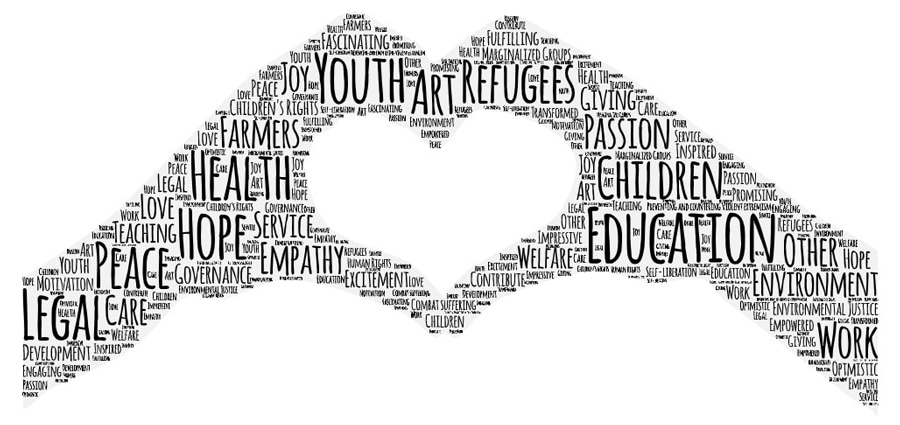
We can tell you about the work of Mathias from Cameroon, who lost his brother to the scourge of drug abuse and was propelled on a pathway to help change the fates of other youth tumbling down that path, especially those susceptible to recruitment as child soldiers in the ongoing conflict in the country. And of Chhavi from India, who has spent the last year covering the farmers' protest in India’s capital, Delhi, against unjust laws. Waking up every morning to motivate the forgotten heroes who we owe the wonderful meals on our tables to. And of Lillian from Nigeria, who chose to spend her time and energy motivating and empowering young people to change the narrative of what it means to be a leader in Africa. And of Andy from the Philippines, who recognized the harms of the human trafficking industry and chose to help create an environment of healing, transformation and safety for the survivors in his country. Or how about Arpeeta, an academic and Lawyer from Bangladesh, who is driven to create an academic environment which allows for students to better challenge socio-cultural stereotypes through justice education.
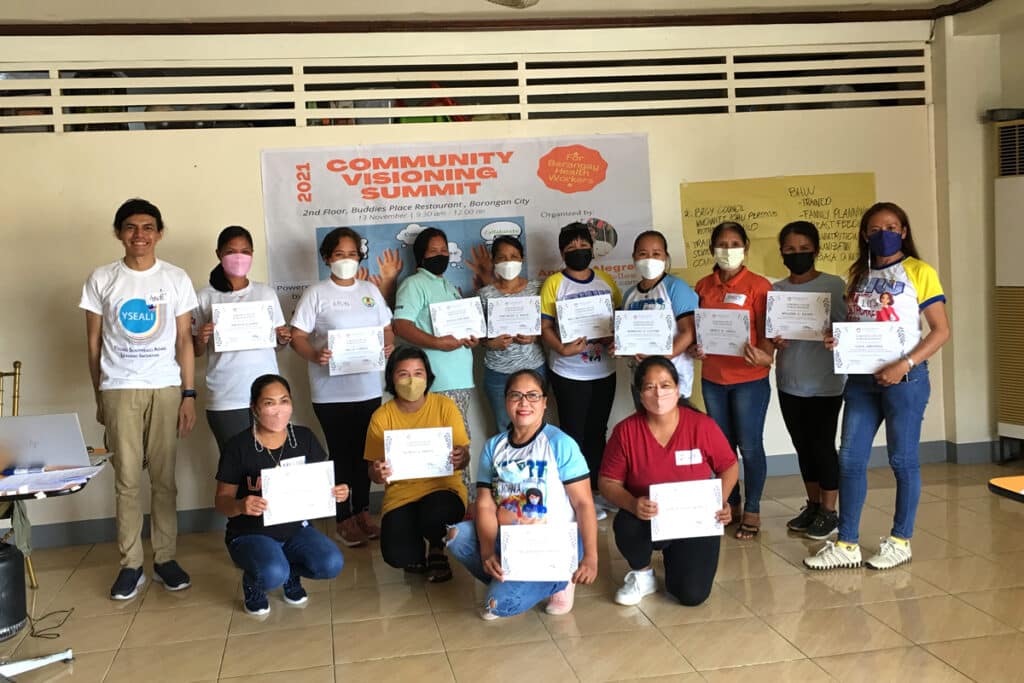
We also draw inspiration from Fatmire from Macedonia, who works to build nonviolent conflict resolution methods for peaceful coexistence between the various ethnicities in Macedonia. And also from Reverend Berry, a minister from South Africa, whose biggest inspiration is to see people happy which encourages her to find ways of bringing different faith-based groups together to facilitate interfaith dialogue. Indeed it is through dialogue and stories that we evolve. That is why Blake from Atlanta built Vngle an app to check the origin of where, when, and how stories are captured and to draw attention to underrepresented stories across the United States of America.
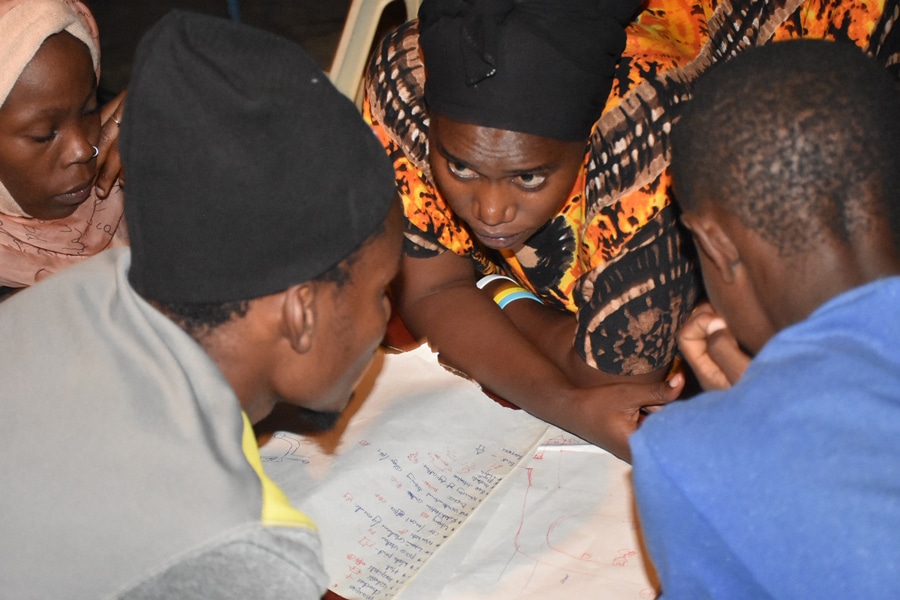
At the grassroots is where these 24 Fellows conduct their work, because top-down approaches cannot elicit the results desired. For example, Jennifer Kuwa knows first-hand the challenges facing the LGBTQI community in Liberia and therefore works to champion for their rights and facilitate access to justice for them. For John from Liberia, who promotes citizen-police relations in the country, this grassroots work involves including those most affected by social challenges, listening to their needs and incorporating their ideas – approaches which are central to the GATHER philosophy and principles which unite the 24 Fellows.
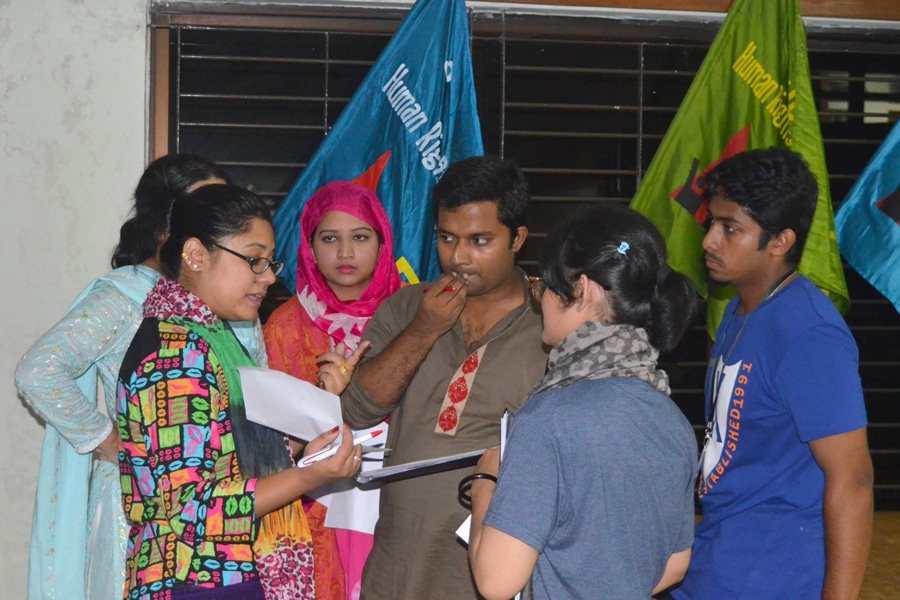
But “the core of what drives us is love, through this work is how I believe love is expressed to the world” says Mahdar, our fellow from Malaysia who is working to build spiritual awareness for Malaysian youth through talks and community projects on arts. Working with youth is central to many of our Fellows work, like Zeenat from South Africa who says “I believe that service to others is the core of what makes us human. I enjoy working with my community and especially, youth, because I feel that children are the essence of a community.” Our youngest Fellow, Luc, a 21-year old from DRC, has taken advantage of his skills in mechanics and programming to empower youth who have no access to education to train them in mechanics to create income-generating activities for them. Another one of our Fellows working closely with youth, but using accessible and engaging ways of doing so, is Lupai from South Sudan who uses radio to amplify youth voices in Juba and provides a platform to discuss social change and peacebuilding through media.
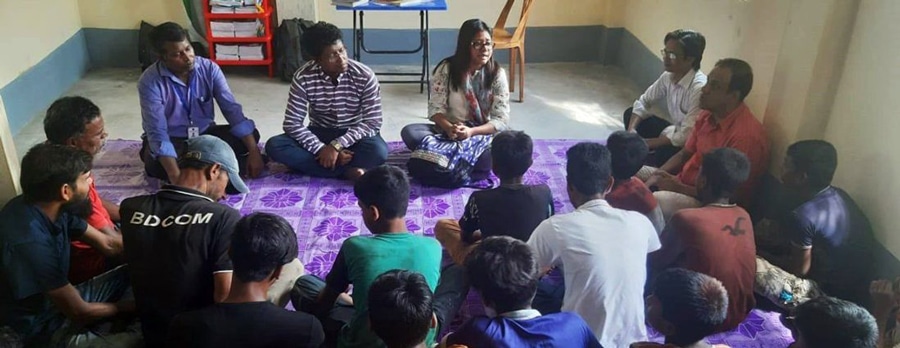
Alongside the empowerment of youth is the belief in the power of education. Sri Ram from Nepal, who is motivated by bringing joy and happiness to those around him, works with Nepalese students on non-violent communication practices and on building emotional intelligence to support greater connectedness among people. Shazmin from Malaysia values education for the most marginalised and supports refugee children, with a focus on Rohingya children, to achieve their full potential as productive individuals through education and skills training workshops in Malaysia. Our colleague Dr Gopal designs hands-on curriculum in the UK which addresses climate change and the sustainable development challenges. Munyaradzi from Zimbabwe is driven by her desire to support women become entrepreneurs and offers motivational seminars to support the economic empowerment of youth and women. For David, decentralising institutional knowledge is vital and so he promotes Spanish literature from emerging Latinx authors as a way of offering new pedagogical experiences. And for Valerie, this desire to support education projects is showcased by her work providing assistance and guidance to low income migrant families in Montreal with their children’s schooling needs.
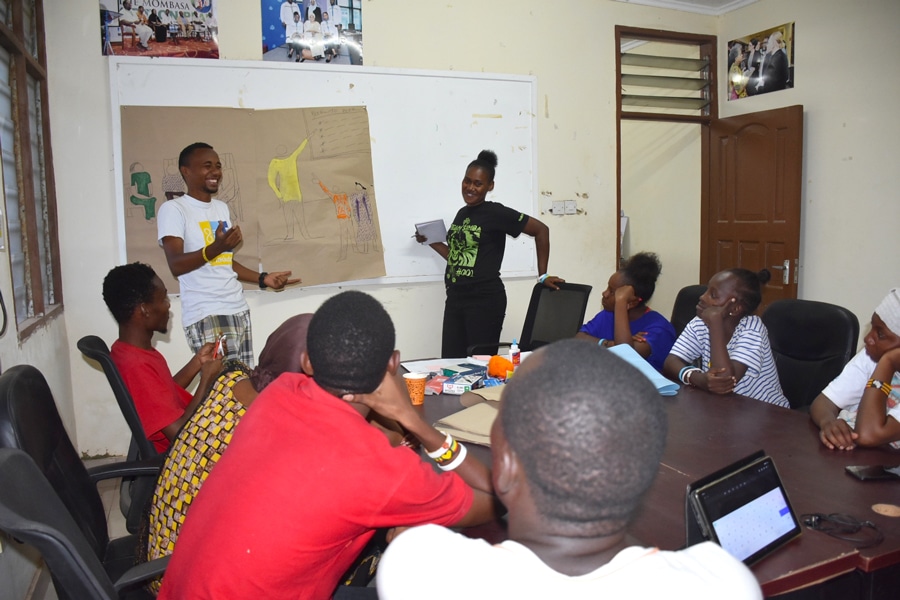
What are some of the characteristics Fellows possess? Patience, community consciousness and an inherent desire to give our best. Be it Ismail’s Tree Plantation campaigns in Nigeria, or Lilian’s socio-governance projects to entrench accountability, or Nicholas’ fight against violent extremism in Kenya, or Nonnel from Florida’s work on environmental justice and community engagement, or Luz Jennifer from Colombia’s projects on environmental, cultural and personal growth.
"Our communities held out their hands to us, we took it. Now, we ask you to take ours." – 2021 Goldin Global Fellows
Join the Global Fellows on the next step of their journey together, by contributing whatever you can to community change globally. Every dollar counts and is extremely appreciated.
A Pathway to Anti-Racist Philanthropy
As Black, Indigenous and People of Color (BIPOC) leaders and deeply committed allies rooted in the communities we serve on the South and West sides of Chicago, we call on funders to rectify the racial inequity that exists in philanthropy, invest in the approaches developed by authentic grassroots leaders, and trust our capacity to manage resources in a way that will lead to our collective liberation.
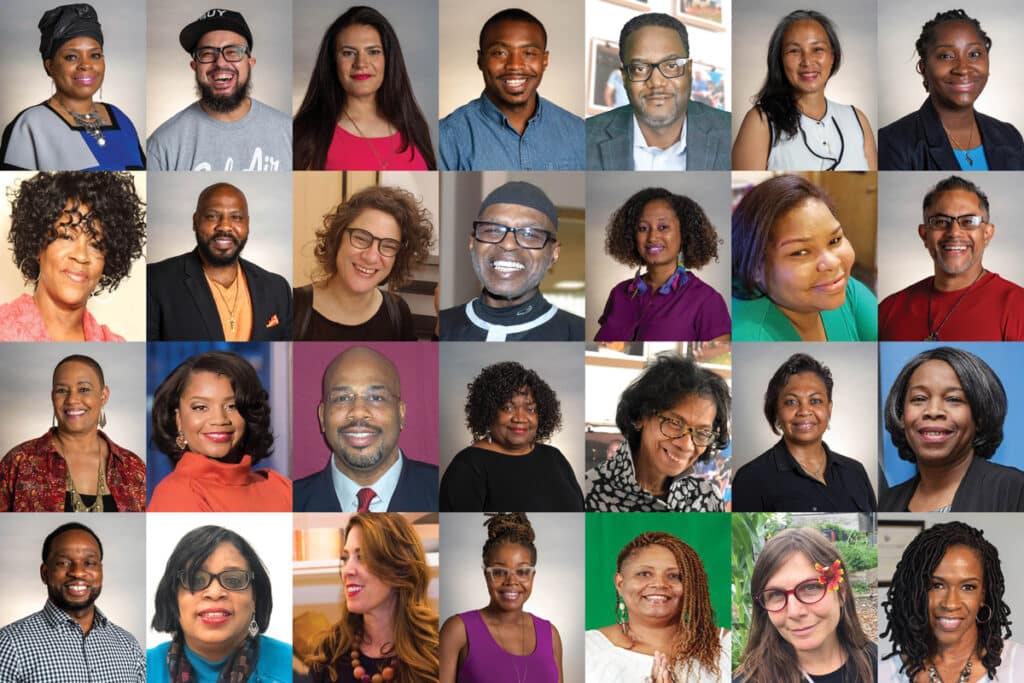
Our organizations are located in and accountable to our communities, yet we continue to be overlooked, undervalued and often cut out by funders. Inspired by the legacy of Phillip Jackson, founder of The Black Star Project, we are renewing the call to Chicago foundations, civic leaders, and those in positions of power to right their relationships with organizations like ours and engage in anti-racist philanthropy.
In this moment, we have seen many funders acknowledge the historic and ongoing impact of systemic racism, anti-Blackness, and the burden of continued divestment in communities of color. We have also seen an increasing number of funders recognize the ways that current funding practices reinforce disparities, particularly for Black-led organizations, which on average have revenues 24 percent smaller than those of their white-led counterparts.
Following the nationwide uprisings in the wake of the murders of George Floyd, Breonna Taylor, Adam Toledo, and too many other people of color, we applauded philanthropy’s commitments to invest more to BIPOC-led organizations. But the reality for those of us on the frontlines of serving our communities is that more than a year later, little has changed. We continue to be called upon to fill in the gaps when systems fail our communities. We face an increase in demand for our services while we continue to be overlooked and underfunded.
The Chicago Peace Fellows Alumni launched the Mutual Aid Collaborative as a model of the structural changes we seek: we are 60 Black and Brown leaders and committed allies who live and work in the communities we serve on the South and West sides, and we practice a liberatory model of shared leadership, accountability, collaborative decision-making and collective action. For us, “community-accountable” means:
- Leadership, board and staff who are rooted in and reflective of our communities.
- Building into everything we do, the cohesion and collective efficacy of our communities.
- Self-determination and anti-racism are front and center in all of our work.
- Rather than scale, the focus of our work is on depth and impact.
- We practice shared leadership to help our communities survive an unjust system as we build our envisioned liberatory future.
Because we are accountable to our communities and connected to each other, our objectives are not to scale our individual organizations to as many neighborhoods as possible. Rather, our objectives are to know, respect and serve our communities, leaving no one behind. Our work is critical and vital to building safe and healthy communities. We are among the first to respond to the needs of individuals because of our deep relationships and localized knowledge. Our organizations advocate for change, build power among community members, and engage in direct service in response to the everyday needs of individuals, all towards the aim of solidarity and liberation.
Today, we call on Chicago Foundations to pledge to take immediate, meaningful action to address racial inequity and establish right relations with community-accountable organizations.
Here are four initial steps you can take to begin to address the racial injustice in philanthropy that holds us back:
1. Equitably fund community-accountable BIPOC-led organizations on the South and West sides of Chicago
Because of racial bias (personal and institutional, conscious and unconscious), our organizations receive less money than organizations led by white leaders, and we call on funders to flip this script. Regardless of the type of work you fund, take a look at your portfolio of grantees and ask yourself whether the organizations you support are truly grounded in, and accountable to, the communities they seek to serve. Consider the appropriate balance in your philanthropy so that the entire ecosystem of organizations and groups can thrive. There are many well-intentioned large nonprofits who do not know our communities and “serve” us without an appreciation for our history, context, and culture. Reallocate some funding to BIPOC-led, community-accountable nonprofits, and support strategies such as community-directed pooled funds that enable grassroots organizations to collaborate and share resources.
2. Engage in authentic relationships that prioritize transparency, truth, and humility
When interacting with our organizations, appropriately value our community expertise, communicate clearly about your processes and how you will make decisions, and dare to build authentic and trust-based relationships (even if you might not fund us). An anti-racist world is only possible if we move past transactional relationships and lean into our shared humanity. Funders who are committed to changing their practices should also be able to recognize the long-standing racialized trauma that our organizations continue to experience in our relationship with philanthropy. Understanding and acknowledging that history should inform how you approach working with us. We also challenge you to engage with us with humility and recognize that we have knowledge and expertise you do not have. Too often, philanthropy views BIPOC leaders from the areas we serve as part of the problem rather than part of the solution. In the future we envision, funders will engage with our organizations in a spirit of partnership with an understanding that we have much we can learn from each other.
3. Provide easy-to-access, multi-year, flexible, and full cost funding
When supporting our work, provide resources that maximize our ability to be creative and impactful, and remove barriers to participation. Multi-year and flexible funding is a good way to start, along with user-friendly and streamlined application and reporting processes designed to reach far into the community. When you create complex processes that require us to jump through multiple hoops and fill out laborious application forms, we end up not accessing valuable funding or spending more time seeking funding than doing our work. Relatedly, we also challenge you to fund the full cost of our efforts and value our work in the same way you value that of academic researchers or outside consultants. Too many of us have experienced the sting of unrealistic expectations from a funder or felt the pressure to over-promise to access funding.
4. Resist the urge to scale without respect for community expertise, and let us define our own measures of success
When working with our organizations, it is imperative that our communities decide their own priorities and determine what success looks like. Over the years, many of our organizations have been asked by funders to “scale” in ways that come at the expense of deepening our work in the communities we already serve. The misguided focus on scaling up single organizations leads to foundations being unduly risk averse and undercuts collaborative approaches based on trust, sharing and collective efficacy. While there are times when scaling up is the right strategy, used without reflection it can create or reinforce problematic power dynamics. We believe that anti-racist philanthropy needs to be centered on self-determination, value the work and wisdom of those of us on the front lines, and build in processes for our communities to determine what success looks like in evaluation and reporting.
All Foundations, corporations or donors that are willing to pledge to stand up for racial equity are invited to connect by completing this short form:
CONNECT WITH US
If you have questions or suggestions, please connect with us at funderspledge@goldininstitute.org or at (312) 951-1691. We also welcome inquiries from other community accountable organizations who share our vision and want to join our movement for a more just and equitable philanthropy.
We know that both immediate and sustained action is required. We look forward to learning together and partnering with you on this long march towards our collective liberation.
Signed: Mona Antwan, Mekazin Alexander, Pastor Robert Biekman, Pastor Victoria Carol Brady, Pamela Butts, Robin Cline, Lisa D. Daniels, Dr. M. Michelle Day, David Gonzalez, La'Keisha Gray-Sewell, Michael Henderson, Dawn Hodges, Pastor Philip Jackson, Dr. Sokoni Karanja, Annette Kelly, Diane Latiker, Frank Latin, Annamaria Leon, Adi Lerner, Jennifer Maddox, Jacquelyn Moore, Damien Morris, Margaret Murphy-Webb, Cosette Nazon-Wilburn, Meghan Olson, Pamela Phoenix, Gloria Smith, Jamila Trimuel, Tameka Walton, Joseph Williams.
This open letter was written by members of the Chicago Peace Fellow’s Mutual Aid Collaborative, a growing network of Black and Brown leaders and committed allies who are alumni of the Chicago Peace Fellows program. As community accountable leaders who live and work in the communities we serve on the South and West sides, we developed this pledge through a liberatory model of shared leadership, collaborative decision-making, and collective action.
SUPPORT THE MUTUAL AID COLLABORATIVE
The Mutual Aid Collaborative is made possible by the Goldin Institute, the Homestead Affordable Development Corporation, the Chicago Lives Healthy + West Side United Fund, the Racial Justice Pooled Fund and the Partnership for Safe and Peaceful Communities.
Meet the 2021 Goldin Global Fellows
The Goldin Institute invites you to learn about each of our 2021 Goldin Global Fellows coming from across the globe, from Argentina to Zimbabwe. This diverse group of fellows will learn and work together as a Community of Practice, building on the talents of their neighbors and the assets of their communities to make real and lasting change around the world.

ABOUT GATHER
The Fellows are learning together through GATHER, which is both a mobile platform for shared learning and a curriculum for people who want to build on the talents of their neighbors and the assets of their communities to make real and lasting change. Gather Fellows learn and work together through an innovative curriculum that comes pre-loaded on a tablet device with all the connectivity, materials, videos, practices and tools necessary to provide a mobile classroom and toolkit for community leadership.
To follow along the learning journey with the 2021 Goldin Global Fellows, please sign up for our newsletter and follow up on Twitter, Facebook and Instagram.
Meet the 2021 Chicago Peace Fellows
The Goldin Institute invites you to learn about each of our 2021 Chicago Peace Fellows representing 14 community areas across the city. Founded in 2019 in collaboration with the Partnership for Safe and Peaceful Communities, the Chicago Peace Fellows program is the only leadership development program that is built by and for grassroots community leaders on the South and West sides of Chicago.

Peace Fellows participate in GATHER, an online asset-based community engagement course, as well as in-person training, collaborative action projects, and networking experiences with civic leaders, academic researchers, and policy makers. The Chicago Peace Fellows reduce violence by building relationships, engaging youth, collaborative peace building projects over the summer and by creating new networks among residents, families, schools, and nonprofit organizations.
ABOUT GATHER
The Fellows are learning together through GATHER, which is both a mobile platform for shared learning and a curriculum for people who want to build on the talents of their neighbors and the assets of their communities to make real and lasting change. Gather Fellows learn and work together through an innovative curriculum that comes pre-loaded on a tablet device with all the connectivity, materials, videos, practices and tools necessary to provide a mobile classroom and toolkit for community leadership.
The Chicago Peace Fellows project connects and equips cohorts of past grantees of the Chicago Fund for Safe and Peaceful Communities to reduce violence and promote peace. The 2021 Chicago Peace Fellows is the third all-Chicago cohort to utilize the GATHER platform, an online learning hub built by the Goldin Institute to empower grassroots leaders.
The participants have been selected from past grantees of the Chicago Fund. They will engage in a 14-week course of intensive shared learning as well as group projects, culminating in a graduation event in November 2021. The curriculum has been designed in collaboration with the grantees themselves, based on their practical knowledge and hard earned wisdom, wit input from a wide range of civic leaders. Fellows will reflect on their past summer work, identify successes and lessons learned, and improve their abilities by sharing strengths and learning new skills.
The Goldin Institute and the Partnership for Safe and Peaceful Communities have aligned missions that value authentic community leadership. The Chicago Fund is uniquely effective at finding motivated problem-solvers and community-builders. By connecting Chicago leaders through GATHER, their efforts to nurture safer and more peaceful communities will be more effective, interconnected and lasting.
A special thanks to the Chicago Community Trust, the Conant Family Foundation, the Polk Bros. Foundation, and the Partnership for Safe and Peaceful Communities for making this program possible.
To follow along the learning journey with the Gather Fellows, please sign up for our newsletter and follow up on Twitter, Facebook and Instagram.
If you would like to apply for the next cohort of Gather Fellows, please email gather@goldininstitute.org.
Creating Harmony Through Music
By: Yusuph Masanja, Co-Facilitator, Global Alumni Network
On January 18th the South Side Jazz Coalition (SSJC) hosted a Zoom meeting to discuss the inequalities in Jazz music in Chicago. The following conversations transpired during the meeting: the absence of live performance venues on the South and West sides, segregation of the sides of the city, Black musicians working with Black and white musicians working with white and how some changes can be made, white Jazz fans coming to the South and West sides and how the media has portrayed areas that are predominantly populated by people of color as places where the bodies are piling up.
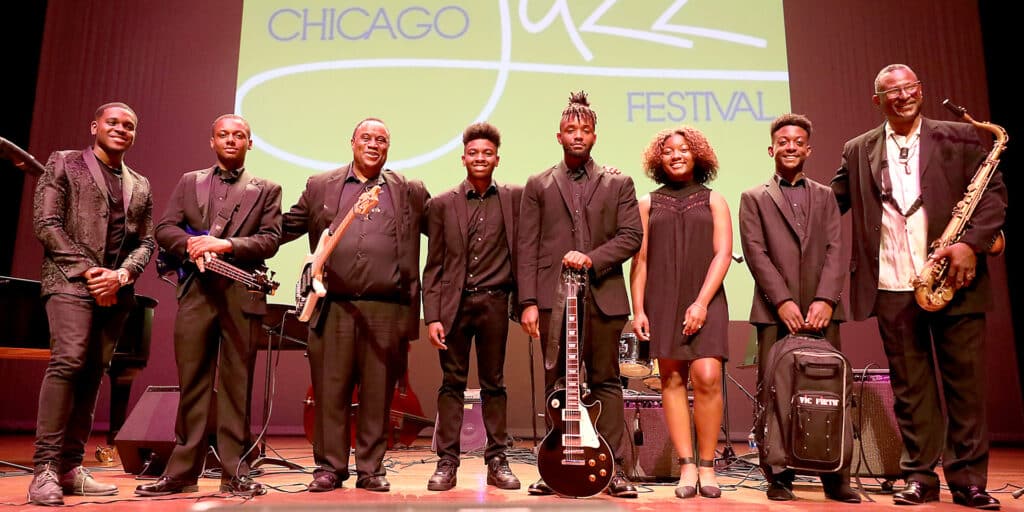
In attendance at this meeting, Margaret Murphy-Webb, founder at SSJC was joined by Commissioner Mark Kelly from DCASE, the director of the Jazz Institute of Chicago, and the executive director of Jazz Journalists of America. Margaret used the techniques learned in the Peace Fellows to run the meeting:
Chicago is one of the most segregated cities in America with a very little cross over between white and Black people who play jazz.
Because of this divide, the Mayor started the initiative called “Together We Heal” to encourage dialogue for the whole month of January. People from all races come together to engage in a dialogue. Margaret decided to organize a dialogue on Jazz because people who control Jazz in Chicago are white and a lot of black musicians are shut out of festivals and other opportunities.
The meeting shed light on this divide and discussed ways to solve the issue.
You know that you have big festivals coming up and there are musicians in the South Side Chicago who are just as good or better as those musicians on the North Side whom you tend to favor, what are we going to do to fix this. These people are working musicians and they need to make money, just like those other musicians also need to make money?
Following this meeting, which will be reconvened again in three months, Margaret is now motivated to organize Zoom classes with musicians. She is planning to conduct classes on social media and grant writing to increase musician’s visibility and empower them with the skills and knowledge necessary for accessing grants. The department of cultural affairs as well as the art council gives grants every year to individual artists. Among other issues, it was stated in the meeting that most musicians miss out on festival opportunities because of lacking an online presence. Furthermore, it was noted that the majority of musicians lack grant writing skills—thus, failing to access support for their own projects.
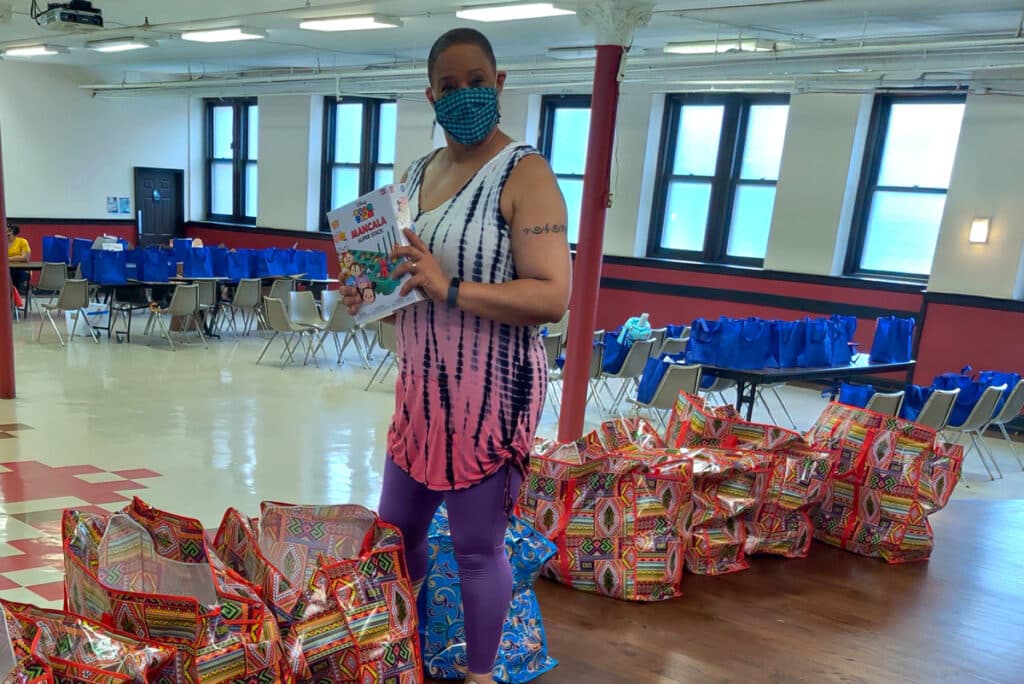
Margaret with the team at SSJC started this nonprofit charitable organization in 2015 to continue the legacy of Earl Lavon Freeman —who ran a free weekly Jazz Jam for over 40 years. When he died, Margaret decided that she will now run these Jam sessions. Their efforts turned into community services.
You just can’t do one without the other, especially with the pandemic. We started doing pop-up jam sessions so that people could just come out in their porches to have music on their blocks because everything was closed down. We’ve also started delivering food and now we have become a community service organization with music on the side.
In 2021, SSJC plans to conduct a Peace Fellow concert, with all the organizations from Chicago contributing. Hopes and prayers are for the pandemic to ease up so that people can get outside, and the Peace Fellows can come together to do that big peace concert.
Margret attributes most successes in her work to the GATHER platform. She started SSJC pretty much alone but through GATHER, she became more focused on the need and mission and met other people like her who are running small organizations that are focused on a mission. She also made new friends with whom they are starting a South East Chicago collaborative to do community services together.
So, GATHER not only helped me to focus on my mission but also gave me some people to work with. It’s a wonderful thing.
Margret has the following message to the Goldin Global Fellows:
I want the Global Fellows to be positive because a change is going to come, we just have to keep on our missions and keep working for the good. I love being part of the Peace Fellows, I love looking at our newsletter and seeing what everybody is doing. I am spreading the word about the Peace Fellows as much as I can.
